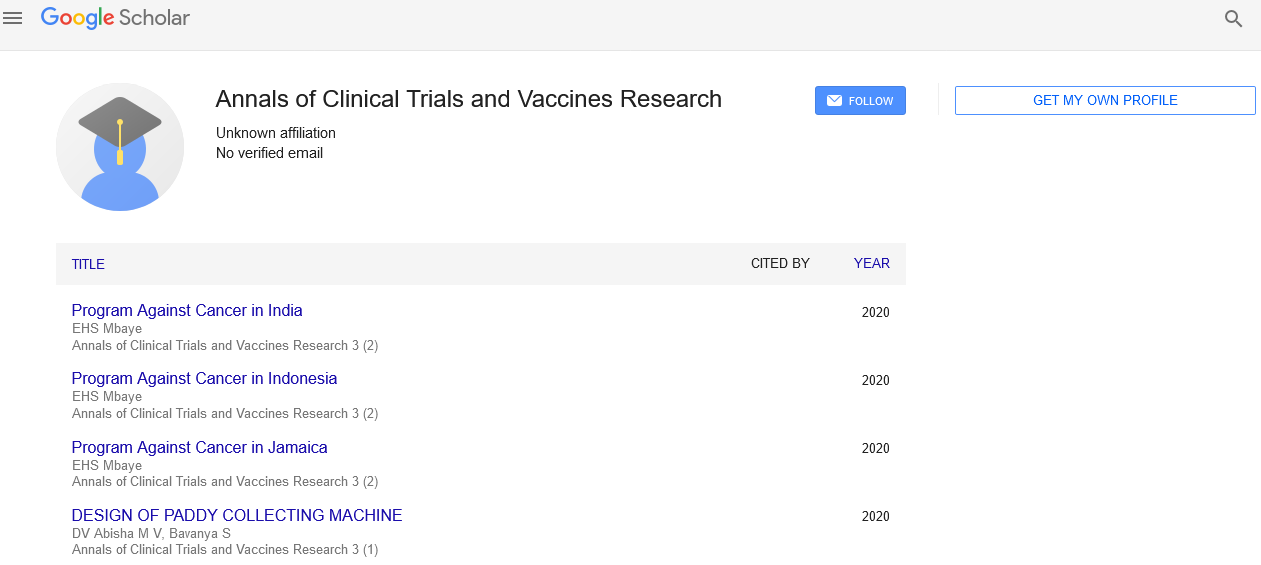Perspective - Annals of Clinical Trials and Vaccines Research (2023) Volume 6, Issue 6
Ethical Considerations in Vaccine Trials with Vulnerable Populations
- Corresponding Author:
- Sechul Chun
Department of Clinical Pharmacy, Chonbuk National University, Jeonju, Korea
E-mail: Sechun@konkuk.ac.kr
Received: 03-Nov-2023, Manuscript No. ACTVR-23-121646; Editor assigned: 06-Nov-2023, PreQC No. ACTVR-23-121646 (PQ); Reviewed: 20-Nov-2023, QC No. ACTVR-23-121646; Revised: 27-Nov-2023, Manuscript No. ACTVR-23-121646 (R); Published: 04-Dec-2023, DOI: 10.37532/ACTVR.2023.13(6).163-164
Introduction
Vaccine development plays a pivotal role in safeguarding public health by preventing the spread of infectious diseases. Clinical trials are a crucial step in this process, allowing researchers to assess the safety and efficacy of potential vaccines.
Clinical trials are typically conducted in multiple phases, each serving a specific purpose. Phase 1 involves a small group of healthy volunteers, assessing basic safety and dosage. In phase 2, a larger and more diverse group, including individuals representing the target population, is included to further evaluate safety and efficacy. Finally, phase 3 involves a much larger population to confirm the vaccine’s effectiveness and monitor side effects.
One of the key ethical considerations in vaccine trials is the inclusion of vulnerable populations. Vulnerable populations encompass various groups, such as the elderly, children, pregnant women, and individuals with specific medical conditions. The rationale for including these groups is rooted in the need to ensure the vaccine’s safety and efficacy across diverse demographics. However, the inclusion of vulnerable populations requires careful ethical scrutiny and safeguards.
For vulnerable populations, such as children or individuals with cognitive impairments, obtaining informed consent may involve additional considerations. Researchers must use appropriate communication strategies and, in some cases, obtain consent from legal guardians or representatives.
In addition to informed consent, the ethical principles of autonomy, beneficence, and justice guide the inclusion of vulnerable populations in vaccine trials. Autonomy emphasizes the right of individuals to make their own decisions, and researchers must respect the autonomy of participants, ensuring that their choices are voluntary and well-informed. Beneficence requires researchers to maximize benefits and minimize harm, underscoring the importance of conducting trials that contribute valuable scientific knowledge while prioritizing participant well-being.
Justice considerations are paramount, emphasizing fair distribution of the benefits and burdens of research. Vulnerable populations are often included in clinical trials to ensure that the resulting vaccines are applicable and safe for diverse demographics. However, justice also entails avoiding exploitation, ensuring that vulnerable populations are not unduly burdened by research participation. Striking a balance between inclusion for the sake of generalizability and protection from exploitation is a delicate ethical challenge.
Regulatory agencies, such as the U.S. Food and Drug Administration (FDA) and the European Medicines Agency (EMA), play a crucial role in overseeing vaccine trials. These agencies have established guidelines and regulations to ensure the ethical conduct of clinical trials and the protection of participants. Rigorous oversight helps maintain the integrity of the research process and fosters public trust in the eventual approved vaccines.
Description
The significance of individuality in personal and societal development: In dividuality, the distinctive essence that sets each person apart, is a profound and multifaceted aspect of human existence. Rooted in philosophy and psychology, the concept of individuality carries immense significance in shaping personal identity and influencing the trajectory of societal progress. This essay delves into the intricate dimensions of individuality, examining its philosophical underpinnings, psychological manifestations, and the far-reaching implications for personal growth and societal evolution.
Philosophical foundations of individuality: At the heart of individuality lies a rich philosophical discourse that spans centuries. From the existentialist reflections of Jean-Paul Sartre to the transcendentalist musings of Ralph Waldo Emerson, thinkers have grappled with the nature of individual existence. Sartre, in his seminal work “being and nothingness,” posits that individuality is not merely a biological given but a continuous process of self-creation. Emerson, on the other hand, celebrates self-reliance and nonconformity, championing the idea that true individuality emerges when one trusts their intuition and resists societal pressures.
Psychological dimensions of individuality: Psychology provides a nuanced perspective on individuality, exploring how personality, cognition, and behaviour contribute to a person’s unique identity. Personality theories, such as the Big five traits or psychodynamic approaches, shed light on the enduring patterns that differentiate individuals. Moreover, cognitive psychology delves into the intricacies of thought processes, emphasizing how individual cognitive styles shape perception and decision-making. The interplay of these psychological elements gives rise to the mosaic of individuality, showcasing the diversity inherent in the human experience.
Personal growth and the cultivation of individuality: The cultivation of individuality is integral to personal growth and self-actualization. As individuals embrace their unique strengths, values, and aspirations, they embark on a journey of self-discovery. This process involves navigating challenges, overcoming adversity, and forging an authentic path. Psychologist Abraham Maslow’s hierarchy of needs underscores the importance of self-actualization, positioning it as the pinnacle of human development. By realizing one’s full potential and embracing individuality, individuals contribute not only to their well-being but also to the richness and diversity of societal tapestry.
Societal implications of embracing individuality: Societal progress is intricately linked to the collective recognition and celebration of individuality. A society that values diversity and respects individual differences fosters innovation, creativity, and social harmony. The history of human achievements is replete with examples of individuals who, by daring to be different, have catalysed transformative changes. From ground breaking scientific discoveries to cultural revolutions, the societal landscape evolves when individuals are empowered to express their unique perspectives and talents.
Challenges to individuality in a conformist society: Despite the inherent value of individuality, contemporary societies often grapple with conformity pressures that can stifle personal expression. Social norms, institutional expectations, and the fear of judgment create challenges for those seeking to fully embrace their individuality. The tension between fitting in and standing out poses a dilemma that many individuals confront, raising questions about societal structures that either nurture or constrain individual expression.
Balancing individuality and collective well-being: While individuality is celebrated, its unchecked pursuit can potentially lead to societal fragmentation. Striking a balance between fostering individual expression and preserving collective well-being is a delicate task. Societal cohesion requires a shared understanding of values, empathy, and a collective commitment to justice. In navigating this delicate balance, societies can harness the dynamism of individuality without compromising the fundamental fabric that binds communities together.
Conclusion
In conclusion, ethical considerations are integral to the entire lifecycle of vaccine development, from the early phases of clinical trials to postmarketing surveillance. Inclusion of vulnerable populations in vaccine trials necessitates a thoughtful and nuanced approach, balancing the imperative for diverse representation with the ethical responsibility to protect the rights and well-being of participants. As science advances, maintaining a robust ethical framework is essential to ensure that vaccines contribute to public health while upholding the principles of autonomy, beneficence, and justice.

